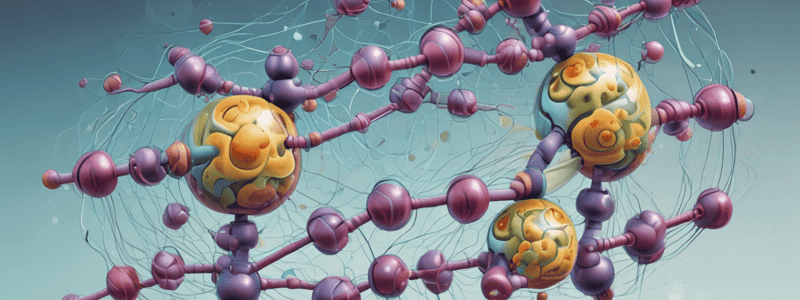Podcast
Questions and Answers
Which of the following body tissues produce alkaline phosphatase (ALP) in high concentration?
Which of the following body tissues produce alkaline phosphatase (ALP) in high concentration?
- Skin, blood vessels, lymph nodes
- Liver, bones, intestines (correct)
- Heart, lungs, pancreas
- Brain, muscles, nerves
What is considered the most useful technique for analyzing ALP isoenzymes?
What is considered the most useful technique for analyzing ALP isoenzymes?
- Spectrophotometry
- Electrophoresis (correct)
- Western blotting
- Chromatography
In normal adults, the main origin of ALP present in sera is from which tissues?
In normal adults, the main origin of ALP present in sera is from which tissues?
- Heart and lung
- Pancreas and intestines
- Kidney and spleen
- Liver or biliary tract and bone (correct)
What is the pH optimum for alkaline phosphatase activity?
What is the pH optimum for alkaline phosphatase activity?
Alkaline phosphatase contributes to which of the following processes?
Alkaline phosphatase contributes to which of the following processes?
Which type of phosphatase is characterized by an optimal activity at pH 9.0?
Which type of phosphatase is characterized by an optimal activity at pH 9.0?
Which of the following roles are performed by alkaline phosphatase in the intestines?
Which of the following roles are performed by alkaline phosphatase in the intestines?
An ALP test may be ordered along with other tests called a liver panel when a patient has symptoms of which disorders?
An ALP test may be ordered along with other tests called a liver panel when a patient has symptoms of which disorders?
Study Notes
Enzymes and Alkaline Phosphatase
- Enzymes are specific biologic proteins that catalyze biochemical reactions without altering the equilibrium point of the reaction or being consumed or changed in composition.
- Alkaline phosphatase (ALP) is an enzyme produced in high concentration in liver, bones, intestines, spleen, placenta, and kidney.
Isoenzymes Analysis and Origin
- Electrophoresis is the most useful single technique for ALP isoenzymes analysis.
- The form present in the sera of normal adults originates mainly in the liver or biliary tract and bone (osteoblasts).
Biological Function of Alkaline Phosphatase (ALP)
- Phosphatases are hydrolytic enzymes that cleave the ester bond between the phosphate group and the organic residue of organic phosphates.
- Alkaline phosphatase has a pH optimum of 9.0 for its activity.
- ALP contributes to various processes, including:
- Transporting nutrients and enzymes in the liver
- Aiding bone formation and growth
- Transporting fatty acids, phosphates, and calcium in the intestines
- Digesting fat in the intestines
- Regulating cell growth, death, and migration during fetal development
ALP Test and Clinical Significance
- An ALP test may be ordered as part of routine laboratory testing, often with a liver panel or liver function tests (LFT).
- The test is also ordered when symptoms of liver or bone disorders are present.
Studying That Suits You
Use AI to generate personalized quizzes and flashcards to suit your learning preferences.
Description
Learn about enzymes, biologic proteins that catalyze biochemical reactions, and alkaline phosphatase, an enzyme produced in various organs. This quiz covers isoenzymes analysis and origin.




